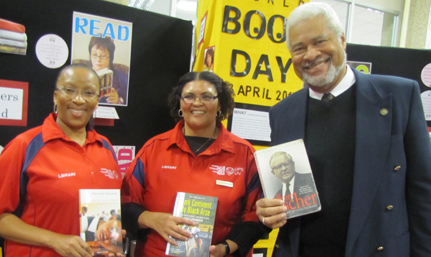|

|
|
Celebrating World Book and Copyright Day were left: Betsy Eister (Director of the UFS Library and Information Services), Senovia Welman (librarian at the UFS Sasol Library) and Prof Charles Dumas (visiting senior professor in the Department: Drama and Theatre Arts).
Photo: Linda Fekisi
23 April 2013 |
The UFS Library and Information Services (UFS LIS) joined the world of literature on 23 April 2013 in celebrating World Book and Copyright Day. Kovsie staff and students were treated to a display of literary works by South African and international authors in the Sasol Library on the Bloemfontein Campus.
The theme chosen for 2013 was, “In Books I Find …,” and the display featured pictures of members of the senior leadership with their favourite books. The theme is endorsed by the Library and Information Association of South Africa (LIASA).
Marcus Maphile, Assistant Director of the UFS LIS, says the purpose of this day is to instill a culture of reading and to highlight important copyright issues. “Libraries regard books and reading as central to nation-building and as tools to stretch the imagination of young South Africans, in particular. This day aims to challenge young people to think outside the box about what can be found in books, beyond words and illustrations.”
Prof Charles Dumas, visiting senior professor in the Department of Drama and Theatre Arts, was the guest speaker at the event and read from Stephen Clingman’s book, titled Bram Fischer: Afrikaner Revolutionary, during his address.